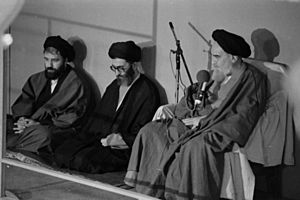Decree facts for kids
A decree is like a special rule or law, usually made by a country's leader, such as a president or a monarch (a king or queen). These rules have the power of law. They are made following specific steps, often written in a country's constitution.
For example, in the United States, the President can issue "executive orders." These are a type of decree.
Contents
Decrees Around the World
Different countries use different names for decrees. Here's how some places use them:
Belgium
In Belgium, a decree is a law made by a regional parliament. For example, the Flemish Parliament makes decrees for its region.
France
In France, the word décret means "decree." It refers to orders given by the French President or Prime Minister. These orders must follow the French Constitution and other laws. If an order doesn't follow the rules, people can ask the French Council of State to cancel it.
Sometimes, the Prime Minister can issue different types of decrees:
- Simple orders (called décrets simples).
- Orders that need advice from the Council of State (called décrets en Conseil d'État). The Council of State gives advice, but the President or Prime Minister still makes the final decision.
Decrees in France can also be:
- Regulations: These help put existing laws into action. They are like detailed instructions for how a law should work.
- Special decisions: These are for specific things, like appointing important government workers.
Only the Prime Minister usually issues regulations. The President's decrees are often for special actions, like dissolving the French National Assembly (their parliament) or calling for new elections. All decrees are published in the official French newspaper, the Journal Officiel de la République Française.
Catholic Church
In the Catholic Church, a decree (called decretum in Latin) is a type of law or rule. The pope can issue decrees, which are like laws for the Church. These can be called papal bulls or motu proprios.
Church groups, like a diocese (an area managed by a bishop), can also issue decrees during their meetings. These decrees must follow the rules of the main Church law, called canon law.
At big meetings like the Second Vatican Council, some important documents were called decrees.
Holy See
The Holy See (the government of the Catholic Church, led by the Pope) uses decrees from the pope. These decrees, like papal bulls, are official laws.
Italy
In Italy, the government can make temporary laws called decrees in urgent situations. However, these decrees must be approved by the Parliament within 60 days. If Parliament doesn't approve them, the decrees lose their power. This rule helps make sure the government doesn't make laws without the Parliament's agreement.
Portugal
Portugal has several types of decrees, made by different parts of its government:
- Decree-law: This is a law made by the Government of Portugal.
- Regional legislative decree: This is a law made by the parliament of an autonomous region (like an island group with its own government).
- Decree of the President of the Republic: This is a decree made by the President of Portugal. It's used for things like approving international agreements or appointing government members.
- Regulatory decree: This is an act by the Government of Portugal to help carry out laws or to make decisions for the country's development.
Iran

In Iran, the Supreme Leader sets the main policies for the country. This is done through decrees. The image shows Ruhollah Khomeini signing a presidential decree for Ali Khamenei in 1981.
Russia
After the Russian Revolution, important government announcements were called "decrees" (dekret). More specific announcements were called ukaz. Both terms are often translated as 'decree'.
Today, in Russia, an ukaz is a presidential decree. It has the power of law, but it cannot change the Russian constitution or existing laws. Laws passed by the Federal Assembly (Russia's parliament) can overrule a presidential ukaz.
The Government of Russia can also issue decrees, which are called Decisions or Orders. These also must follow the constitution, laws, and presidential decrees.
Saudi Arabia
In Saudi Arabia, laws are mainly created through Royal decrees, which are issued by the King.
Spain
In Spain, decrees come in different forms, such as:
- Royal decree
- Royal Decree-Law
- Royal Legislative Decree
Turkey
In Turkey, the President can issue decrees, especially after changes were made to their constitution in 2017.
United Kingdom
In the United Kingdom, there are "Orders-in-Council." These are special laws or rules made by the King or Queen, usually on the advice of the Privy Council. They can also be made by a government minister using power given by Parliament.
United States
In the United States, the word "decree" used to be used for orders from a special type of court called a "court of equity." Now, the word "judgment" is usually used instead.
A decree or judgment can be:
- Final: This means it completely settles a legal case.
- Interlocutory: This is a temporary decision that doesn't fully end the case. More steps are needed later.
Executive orders, issued by the President to the government, are also a type of decree. They have the power of law, but they cannot go against the Constitution or existing laws. State governors can also issue their own executive orders.
Other Uses of the Term
Sometimes, judges in courts use the word "decree" for certain types of court orders. For example, a "divorce decree" is the official court order that ends a marriage.
See also
 In Spanish: Decreto para niños
In Spanish: Decreto para niños
- Consent decree
- Edict
- Fatwa
- Firman
- Proclamation
- Rule by decree
- Rescript
- Soviet Decree
- Ukase
 | Precious Adams |
 | Lauren Anderson |
 | Janet Collins |

